16 Open-source Self-hosted Web Chat Systems
Are You Truly Ready to Put Your Mobile or Web App to the Test?
Don`t just assume your app works—ensure it`s flawless, secure, and user-friendly with expert testing. 🚀
Why Third-Party Testing is Essential for Your Application and Website?We are ready to test, evaluate and report your app, ERP system, or customer/ patients workflow
With a detailed report about all findings
Contact us nowTable of Content
A self-hosted chat system refers to a chat application that can be installed and run on a user's own servers or infrastructure, rather than relying on a third-party service. This gives users full control over their chat data, privacy, and customization options. Here are some benefits of self-hosted chat systems for productivity:
Benefits for Productivity:
- Data Ownership: With a self-hosted chat system, users have complete control and ownership over their chat data. They can ensure the security and privacy of their conversations, reducing the risk of sensitive information being accessed by unauthorized parties.
- Customization: Self-hosted chat systems offer greater flexibility and customization options compared to relying on third-party services. Users can tailor the chat system to their specific requirements, adding or modifying features to suit their team's needs.
- Integration: Self-hosted chat systems can be seamlessly integrated with other internal tools and systems, such as project management platforms or customer support systems. This allows for efficient collaboration and streamlined workflows.
Advantages for Teams:
- Enhanced Collaboration: Self-hosted chat systems provide teams with a centralized platform for communication, enabling real-time collaboration and quick decision-making. Team members can easily share information, discuss ideas, and coordinate tasks.
- Privacy and Security: By hosting the chat system internally, teams can ensure that their conversations and data are secure. They have full control over access permissions and can implement additional security measures as needed.
- Reduced Reliance on External Services: Self-hosted chat systems eliminate the reliance on third-party services, reducing the risk of service interruptions or data breaches. Teams can have peace of mind knowing that their chat system is under their direct control.
Own Your Data
Own Your Own Data:
- Complete control over chat data and privacy
- Ability to comply with data protection regulations
- Reduced dependency on external service providers
- Enhanced security measures can be implemented
- Flexibility to customize and integrate with other tools
By opting for a self-hosted chat system, teams can enjoy the benefits of increased productivity, improved collaboration, and full control over their data and privacy.
Here, you will find the best free and open-source self-hosted chat and messaging systems.
1- Rusty Chat

This is an open-source chat app, which written in Rust and React.js.
2- Anomly

Anomly is a web-based chat app that allows users to chat anonymously and create unlimited chat rooms. It is built using Next.js for server-side rendering, Socket.IO for real-time communication, and React Testing Library for testing.
3- Rocket.chat
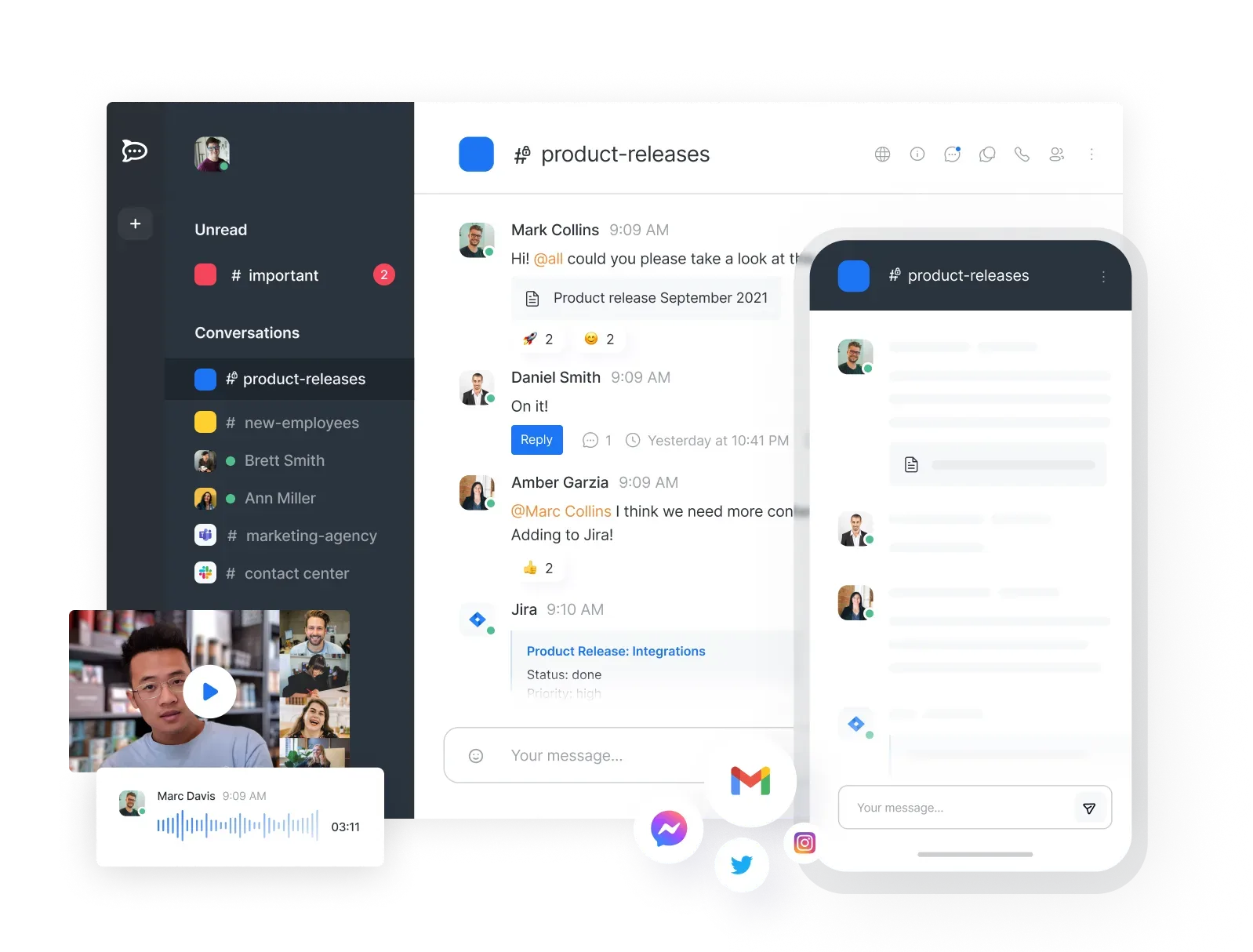
Rocket.Chat is an open-source communications platform that offers team collaboration, omnichannel customer service, a chat engine for customized messaging experiences, and a marketplace for various apps and integrations.
4- Let's Chat
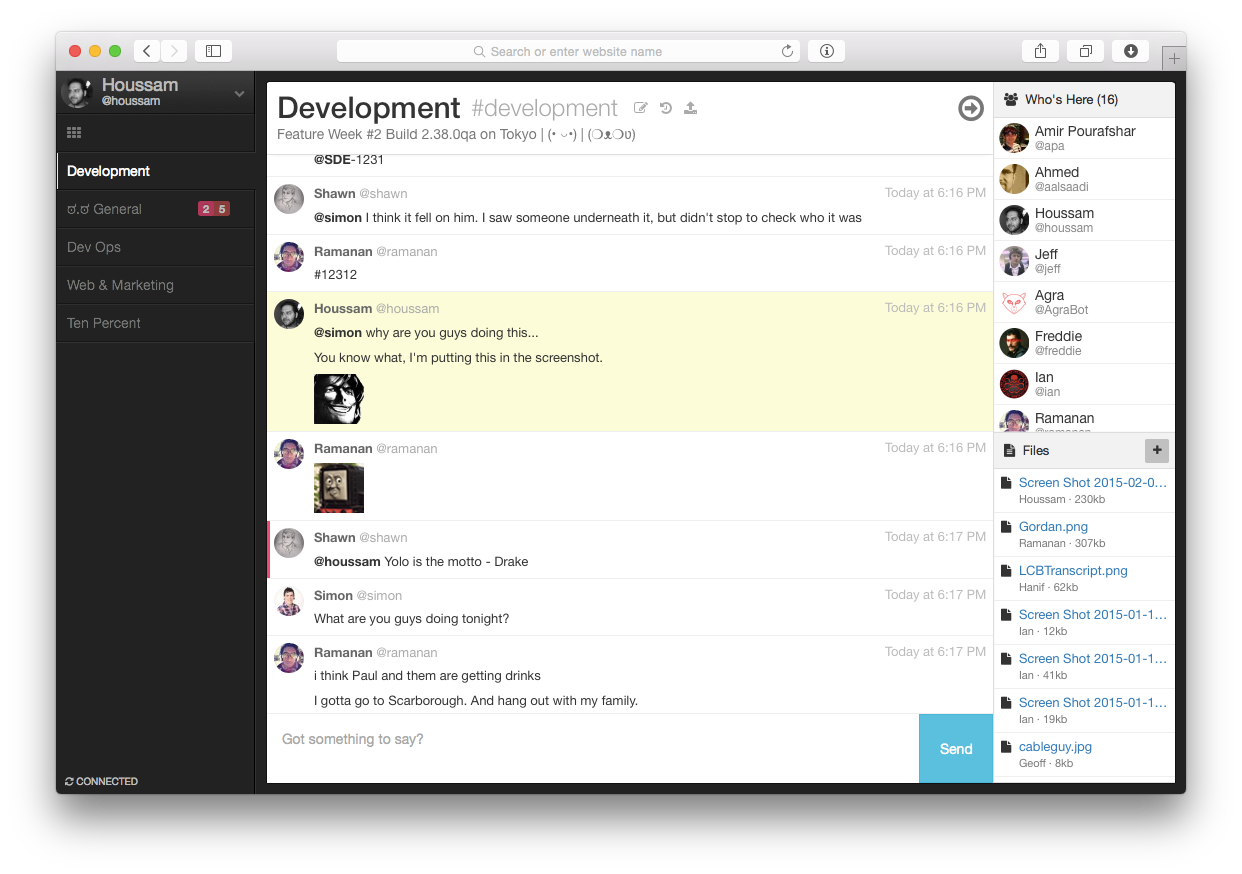
Let's Chat is a self-hosted chat app for small teams. It is licensed under the MIT License.
With its extensive feature set and flexibility, Let's Chat provides a robust and customizable chat solution for small teams. Whether it's for project collaboration, team discussions, or general communication, Let's Chat has you covered.
Features
- Persistent messages: Messages are stored and can be accessed even after logging out.
- Multiple rooms: Users can create and join different rooms for different topics or projects.
- Private and password-protected rooms: Users can restrict access to certain rooms by setting passwords or making them private.
- New message alerts: Users are notified whenever a new message is posted in a room they are part of.
- Mentions: Users can tag specific individuals or notify everyone in the room using the @ symbol.
- Image embeds: Users can easily share and embed images in their messages. They can also search for GIFs using Giphy.
- Code pasting: Users can share code snippets in a clean and formatted way.
- File uploads: Users can upload files directly in the chat, whether it's from their local storage or from cloud storage services like Amazon S3 or Azure.
- Chat history: The application keeps a record of all the messages exchanged, allowing users to search for specific content.
- XMPP multi-user chat: Users can engage in group discussions using the XMPP protocol.
- 1-to-1 chat: Users can have private conversations with each other using XMPP.
- Authentication options: Let's Chat supports various authentication methods including local authentication, Kerberos, and LDAP.
- Hubot adapter: Users can integrate Hubot, a popular chatbot framework, into Let's Chat for additional functionality.
- REST-like API: Developers can leverage the API to build custom integrations and automate tasks.
- Basic i18n support: Let's Chat has built-in support for internationalization, allowing users to use the application in their preferred language.
- Licensed under the MIT License: Let's Chat is released under the permissive MIT License, giving users the freedom to use and modify the application as they see fit.
5- Tinode
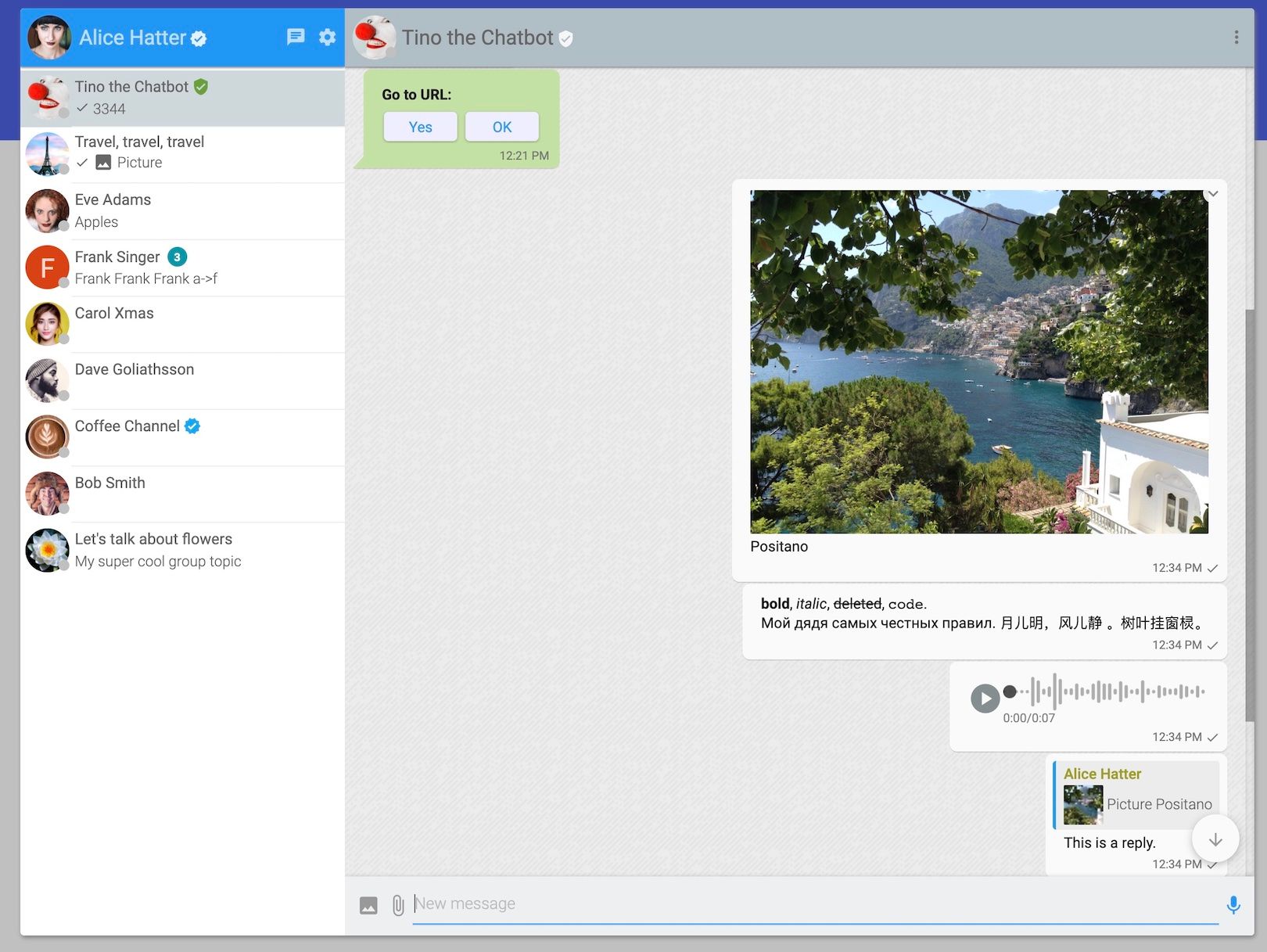
Tinode is a web-based chat app with a backend in Go and client-side bindings in Java, JavaScript, and Swift. It is not compatible with XMPP but can be seen as a replacement. Tinode offers Android, iOS, and web versions, as well as a command line option.
Features
- User features:
- One-on-one and group messaging.
- Video and voice calls. Voice messages.
- Channels with unlimited number of read-only subscribers.
- All chats are synchronized across all devices.
- Granular access control with permissions for various actions.
- User search/discovery.
- Rich formatting of messages markdown-style: *style* → style, with inline images, videos, file attachments.
- Forms and templated responses suitable for chatbots.
- Verified/staff/untrusted account markers.
- Message status notifications: message delivery to server; received and read notifications; typing notifications.
- Most recent message preview in contact list.
- Server-generated presence notifications for people, group chats.
- Forwarding and replying to messages.
- Editing sent messages.
- Administration:
- Granular access control with permissions for various actions.
- Support for custom authentication backends.
- Ability to block unwanted communication server-side.
- Anonymous users (important for use cases related to tech support over chat).
- Plugins to extend functionality, for example, to support moderation or chatbots.
- Scriptable command-line tool for server administration.
- Performance, reliability and development:
- Sharded clustering with failover.
- Storage and out of band transfer of large objects like images or document files using local file system or Amazon S3 (other storage systems can be supported with media handlers).
- JSON or protobuf version 3 wire protocols.
- Bindings for various programming languages:
- Javascript with no external dependencies.
- Java with dependencies on Jackson and Java-Websocket. Suitable for Android but with no Android SDK dependencies.
- Swift with no external dependencies.
- C/C++, C#, Go, Python, PHP, Ruby and many other languages using gRPC.
- Choice of a database backend. Other databases can be added with by writing adapters.
- MySQL
- PostgreSQL
- MongoDB
- RethinkDB
6- Messenger (iOS)
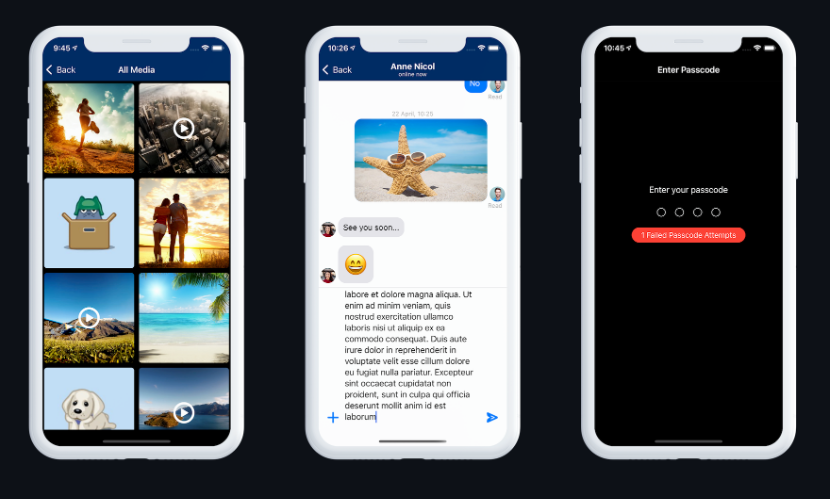
RelatedChat is an open-source communication platform with updated iOS (Swift), new Android (React Native), and new Desktop browser (React) versions. It uses a single backend server with GraphQLite.
RelatedChat app has various features including direct and channel chat functionality, sending text, emoji, photo, video, audio, and GIF messages, as well as stickers. It supports media file cache, re-download and network settings, typing indicator, message delivery and read receipts, and more. The app has a customizable user interface, supports iOS Dark Mode, and is compatible with iPhone SE to iPhone 13 Pro Max.
7- Chat UI Kit React
Chatscope is an open source UI toolkit for developing web chat applications with React components. It allows users to build their own chat UI in a few minutes.
8- ysChat
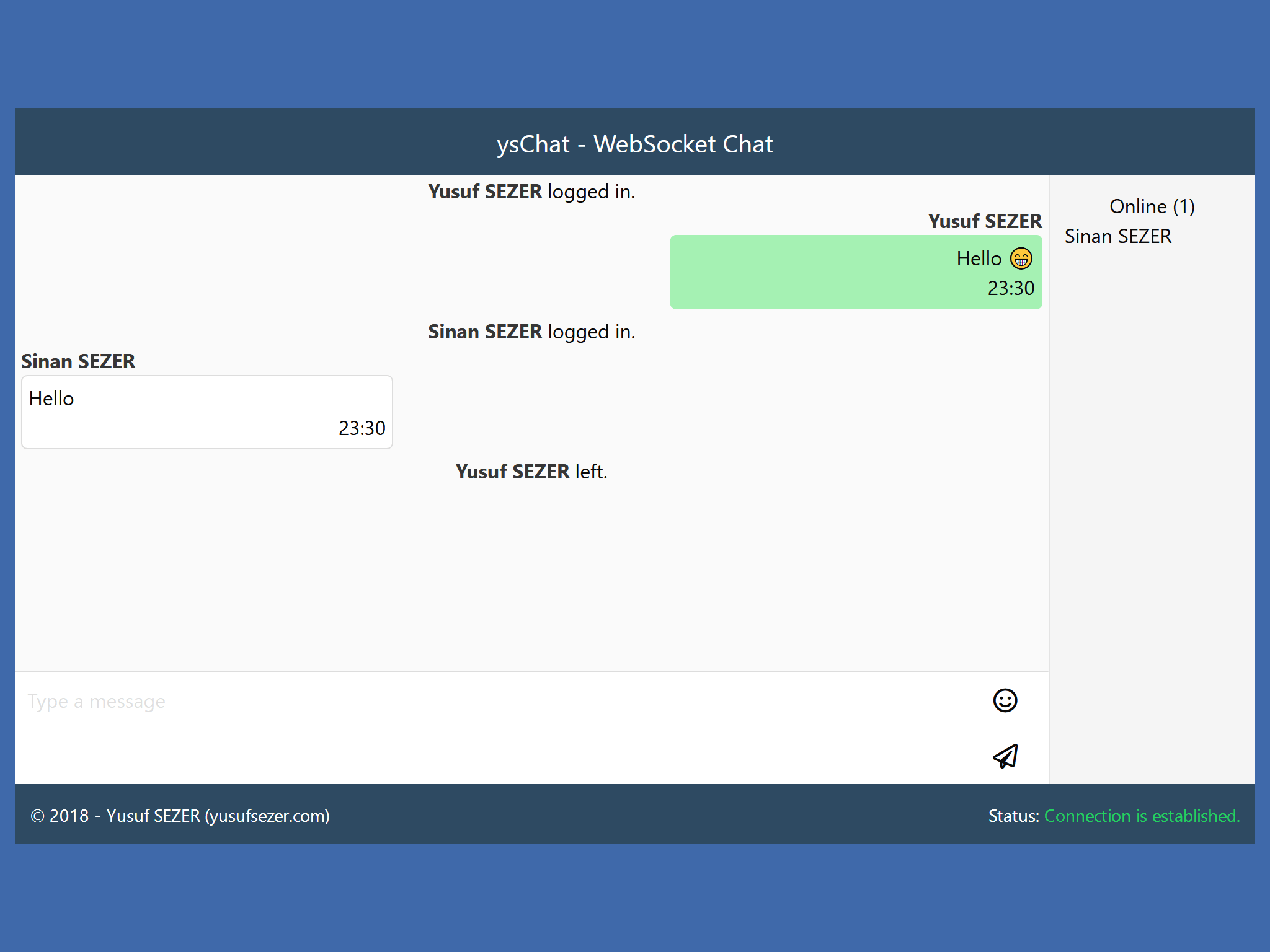
ysChat is a web-based chat application built with Express.js, Socket.IO, ReactJS, and Bulma.
9- Chat
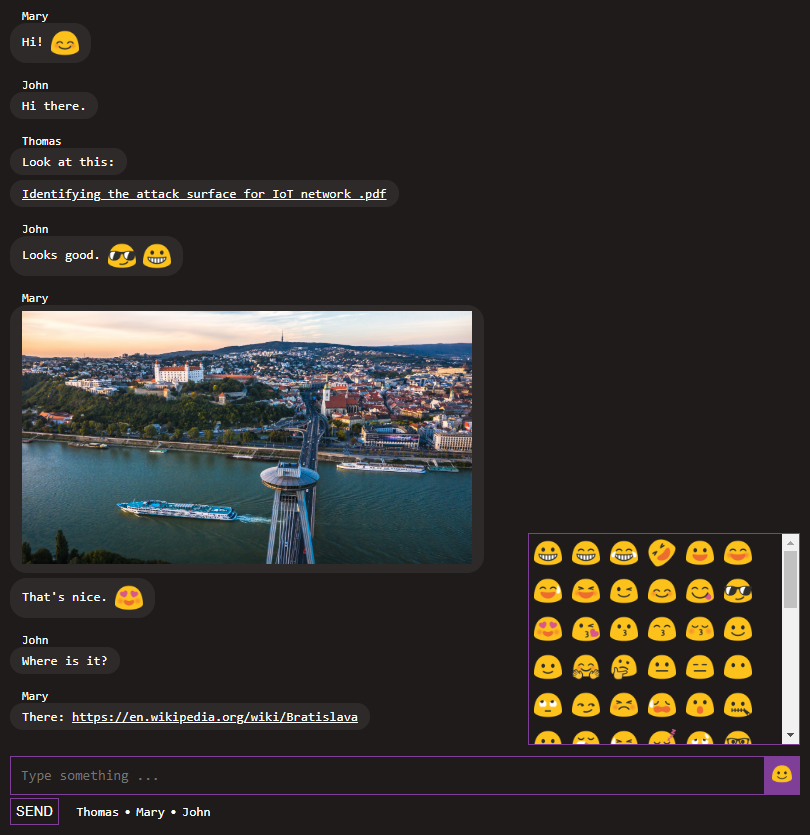
This web-based chat app is a simple and user-friendly real-time JavaScript chat implemented using Socket.io. It offers features such as no user accounts, no saved history, no configuration, only one room, file sharing without server storage, and a limited number of emojis.
10- Libre Chat
Libre Chat is a free and open-source web-based chatbot service that can be easily configured and deployed. It is fully self-hosted, offline capable, and does not require knowledge in machine learning or programming. It can be set up with a YAML file and started with a single command. It is available as a pip package or a Docker image and does not require a GPU to run efficiently.
11- EZchat
EZchat is a web-based chat app built on .NET Core 3.1 and SignalR. It is designed for small groups and can be hosted on various platforms. It also supports the use of Tor and FreeDNS.
Features
- Simple messaging
- Simple moderation
- Recent message cache
- Connection status
- Online user list
- TTS mode
- Profanity filter
- Compatibility with Tor and FreeDNS
12- Chat Desk
Chat Desk is a web-based chat application written in Flutter. It is free, open-source, and allows users to self-host their own chat rooms. It offers complete private chatting, ensures no data collection, has an unbreakable core, and is truly open-source.
It works on Windows, macOS and Linux.
13- BitChat
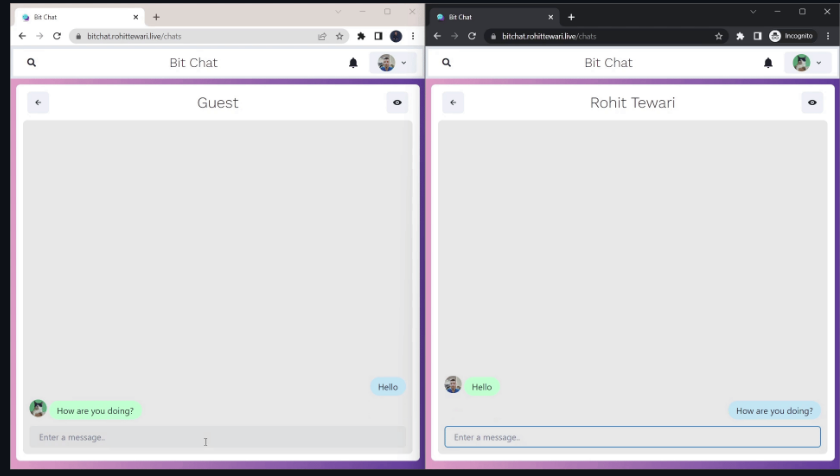
BitChat is a web-based chat application built with the MERN stack that supports real-time communication using Socket.io. It features a fully responsive UI, user authentication with email, encrypted passwords, toast notifications, the ability to create group chats, and typing indicators.
14- React Chat App
A web-based chat app built with React.js, Socket.io, and Node.js. The app uses Material UI for the layout and does not require a database as everything is read-only.
Features
- shows online users
- all users sorted based on online status
- default set of users to signin
- users divided my company
- users from one company cannot see/chat with users from other company
- first 4 users from company A and rest 4 belongs to company B
- default chatroom/channel where all users of a company is listening
- handled multiple tab for same user
15- Abuzercord App
Realtime chat app with web sockets using Node.js, Express and Socket.io
16- Mercurius
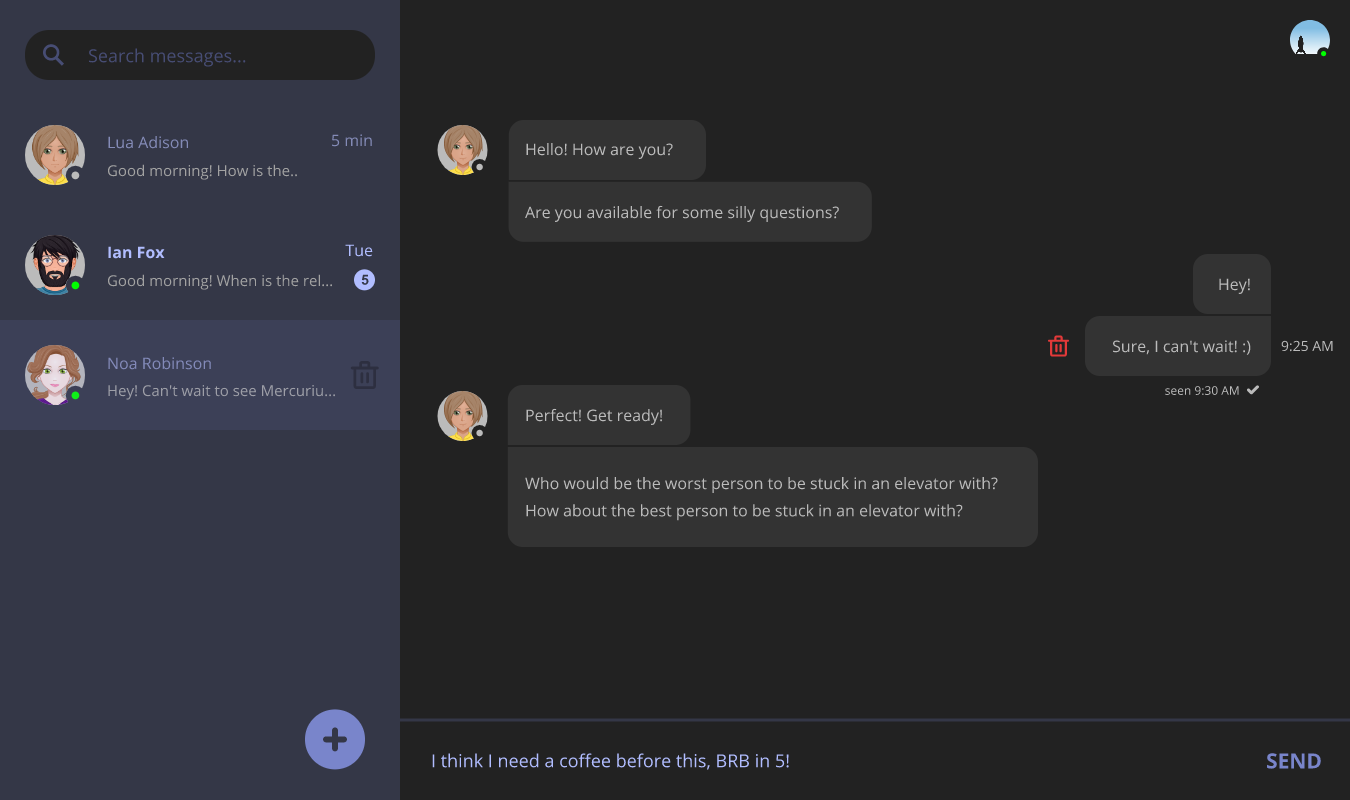
Mercurius is an exceptional real-time messenger system that utilizes the power of Laravel and Vue.js. It boasts a comprehensive application that can be seamlessly installed with any Laravel project, ensuring a smooth and hassle-free experience.
Features
- Real-time Messenger
- Responsive
- Multilingual
- Browser notifications
- Unique UX, with dark theme
- Typing indicator
- Remove conversations and messages
- Search recipients with auto-complete











